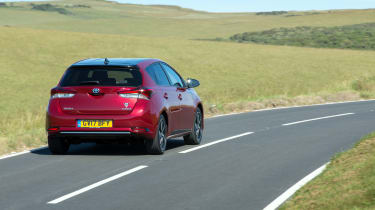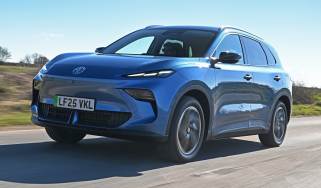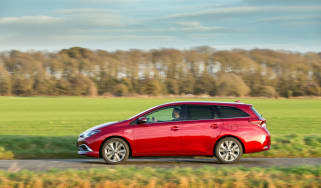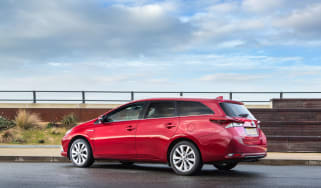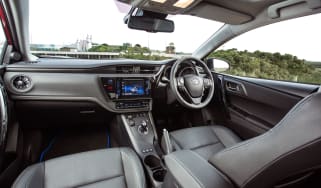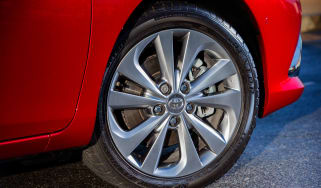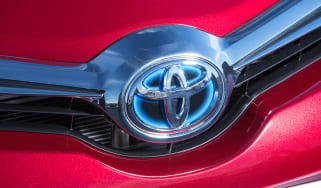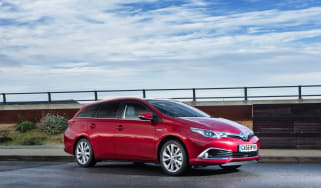Toyota Auris Hybrid (2013-2019) review
This generation of Toyota Auris Hybrid boasted impressive efficiency and plenty of equipment, but rivals offered far more polish and passion
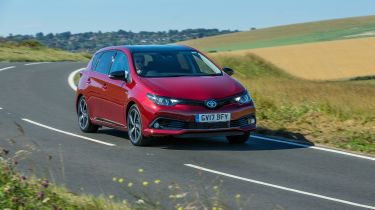
Pros
- Easy to drive
- Low running costs
- Generous standard equipment
Cons
- Unexciting to drive
- Limited all-electric range
- Dated design inside and out
| Car type | Fuel economy | CO2 emissions | 0-62mph |
|---|---|---|---|
| Hybrid | 72mpg | 91g/km | 10.9s |
The Toyota Auris has now been replaced by the excellent Toyota Corolla, but this Ford Focus, Volkswagen Golf and Vauxhall Astra rival was in some ways ahead of its time by offering hybrid power – something carmakers are rushing to implement in their modern vehicles.
The Auris uses a still-relevant ‘self charging’ hybrid set-up, where there’s an efficient petrol engine mated to a small electric motor and battery arrangement. It can drive for short periods on electric power, but it mostly uses the engine - yet it brings very good efficiency without the need to charge up at a wallbox or plug.
The Auris uses a similar set-up to the well-known Toyota Prius – including the same 1.8-litre petrol engine, motor and battery, plus a continuously variable transmission (CVT). It sounds complicated but this is just a type of automatic gearbox that uses belts instead of gears. When it was new, the Auris seemed to lag behind the competition when it came to the driving experience, interior quality and visual appeal, yet it now seems like an excellent option if you want a used family car that uses hybrid power. If you’re in the market, be sure to read our guide to buying a secondhand Auris.
There are some interesting used hybrids to choose from including the Hyundai Ioniq and the Kia Niro, but the Auris Hybrid is a more conventional family car that just happens to have a hybrid powertrain. It’s good if you need practicality, reliability and relaxing driving in traffic, plus low running costs.
If you can stretch to the newer Toyota Corolla, we'd certainly recommend it: the newer model is a much more accomplished all-rounder. The Corolla is more fun to drive, has a better interior, is more interesting to look at, has more equipment and is more comfortable as well. Yet the Auris is still in demand thanks to its high build quality and reliability as a used car.
The Auris is best considered as an alternative to the usual family-car options if you live and drive in a city: those who make a lot of trips into town will benefit most from the electric motor. Such users may also enjoy the no-nonsense nature of the Auris, and are certain to appreciate the generous standard equipment fitted to every model. There were four trim levels when new, each of which could be chosen in hybrid form, and the Icon Tech represented the best value for money when new – it's the model to go for if you're looking at used examples, too.
As the second model in the pecking order, it added sat nav to a kit list that already included air-conditioning and a seven-inch infotainment display with DAB radio and a reversing camera. While its interior design does as little to stir the soul as the car's exterior styling, the Auris was extremely well assembled from materials that seem well suited to the rigours of daily life. It was no class-leader for interior space or load capacity, but the more versatile Skoda Octavia failed to offer a hybrid engine at the time (although it now has a plug-in hybrid option).
Families, meanwhile, will be reassured by the standard Toyota Safety Sense package of autonomous emergency braking (AEB), lane-departure warning, automatic headlights and road-sign recognition. A five-star Euro NCAP crash-testing rating wins points, too, and Toyota's reputation for reliability is backed up by a brilliant warranty scheme that can offer up to ten years’ cover on a rolling basis. Running costs should generally be low, although service intervals are only 10,000 miles apart.
While it's not what you'd call a compelling package, the Auris is still worth a look if you want a dependable, comfortable car that makes a minimal impact on urban pollution. Cars like the Hyundai Ioniq Plug-In and Toyota's own Prius Plug-In offer greater all-electric range, but are also rather more expensive to buy, which is why we featured the Auris in our list of the best cheap hybrid cars. For a more detailed look at the Toyota Auris hybrid, read on for the rest of our in-depth review...
